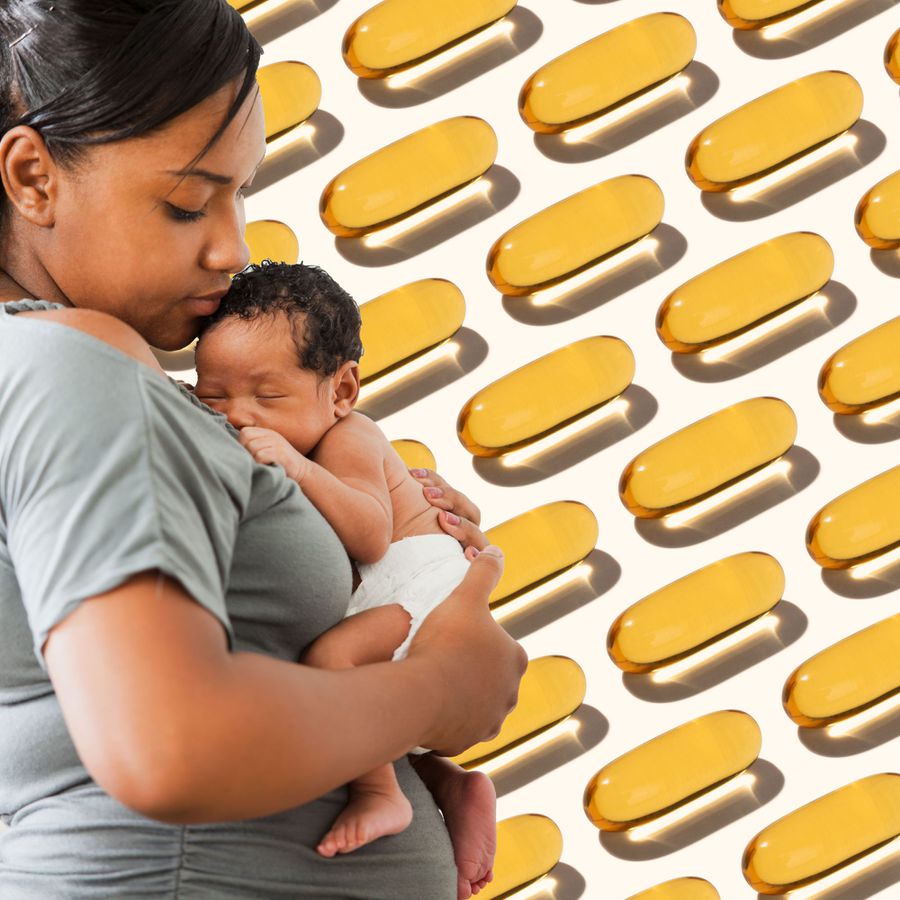We independently research, test, review, and recommend the best
products—learn more about
our process. If you buy something through our links, we may earn a commission.

Few things in life are certain. But a doctor suggesting prenatal vitamins to a pregnant woman? That’s practically a given. We know that prenatal vitamins help ensure the healthy development of the baby and balanced nutrition throughout pregnancy for mom.
“I recommend taking vitamins postpartum; however, they don’t necessarily have to be a special, specific postnatal vitamin,” she says. Here’s why: Taking a regular multivitamin or continuing your prenatal vitamin from pregnancy will provide the necessary vitamins and minerals needed to support breastfeeding, as well as help new moms keep up their strength and energy. In general, Dr. Sekhon says it makes sense to continue taking a prenatal vitamin for a minimum of six weeks postpartum or for the duration that you’re breastfeeding. After that, it’s fine to switch back to a regular multivitamin.
A potential downside to taking prenatal vitamins after childbirth is constipation due to their higher concentration of iron, says Dr. Saadat. In this case, he recommends new moms switching to a women’s multivitamin, such as the common GNC or Centrum brands (Buy It, $10, target.com), which generally provide close to 100 percent of the daily requirements for vitamins and minerals.
Some specifics to keep in mind, however, are that women who are breastfeeding may require more calcium, and those staying indoors often with a new baby may need extra vitamin D due to lack of sun exposure, he says.
Okay, but what about all those hormone changes post-delivery? Can postnatal vitamins help with those? Unfortunately, no vitamins are known to be helpful in managing postpartum fluctuations in hormones themselves, says Dr. Sekhon. “Hormone changes don’t necessarily need to be managed as they are a healthy, normal part of the process of recovering from pregnancy and delivery.” However, specific issues that result from hormonal changes after delivery, such as hair loss or hair thinning, may be improved by taking vitamins, such as biotin, vitamin B3, zinc, and iron, says Dr. Sekhon. (See also: Why Some Moms Experiences Major Mood Shifts When They Stop Breastfeeding)
Can you just get these vitamins and nutrients from your diet, instead?
Some ob-gyns say that new mothers should strive to get all the nutrition they need from a well-balanced diet in the postpartum period before turning to a daily vitamin to supplement their intake. One such doc, Brittany Robles, M.D., an ob-gyn and NASM-certified personal trainer based in New York City, recommends all postpartum women ensure they are getting the following nutrients in their diet:
In general, Dr. Robles says she doesn't advise her patients to take postnatal vitamins. "There is no doubt that prenatal vitamins are essential for every woman to prevent the risk of neural tube defects in your baby," she says. "However, once the neural tube is formed, in the first trimester, the vitamins become a convenience rather than a necessity."
Of course, carefully planning your food to ensure you obtain all the necessary nutrients post-childbirth is easier said than done. Plus, postpartum women should be consuming an extra 300 calories per day because they lose calories through the breastfeeding and pumping, meaning they need more than usual to adequately fuel their body, explains Dr. Robles. This is why she recommends her postpartum breastfeeding patients consume protein-rich foods, such as lean meats, salmon, beans, legumes, and nuts rather than eating, say, several snacks throughout the day to focus on satiety.
Breastfeeding moms should also eat foods that help promote milk production—such as leafy greens, oats, and other fiber-rich foods—and stay hydrated. Dr. Robles says a postpartum woman should be consuming at least half of her body weight in water per day because she is hydrating her baby (breast milk is made of 90 percent water) as well as her own body. So, for a woman weighing 150 pounds, that would be 75 ounces or around 9 glasses of water (at minimum) a day, and more if she’s breastfeeding.
What about other postnatal supplements?
Aside from vitamins, there are also plant-based supplements that may help keep your postpartum mind and body healthy. Fenugreek, an herb similar to clover that’s available in capsules like Finest Nutrition Fenugreek Capsules (Buy It, $8, walgreens.com), is most widely used in the postpartum period as a way to increase milk supply, says Dr. Sekhon. It is believed to stimulate the glandular tissue in breasts, which is responsible for producing milk. While fenugreek is generally regarded as safe by the FDA, it can have side effects, such as diarrhea, in both mother and baby (as it is known to pass into the breast milk), so it’s important to start with the lowest dose and then increase only if your body tolerates it, she explains. Because of these GI side effects, be sure to seek out your doctor’s advice before taking and, unless you’re struggling with milk supply, consider avoiding altogether.
While melatonin isn’t a vitamin, (rather it’s a hormone that occurs naturally in the body to regulate circadian rhythm) it can be a helpful sleep aid, especially for new moms who are sleep-deprived and have a disturbed sleep pattern from nighttime diaper changes and feedings, says Dr. Sekhon. It is safe for women to take melatonin while breastfeeding, but it should be used with caution, as it can cause drowsiness—and you always want to make sure you’re alert when caring for a small baby, she explains. As an alternative to melatonin, she advises sipping chamomile tea or taking a warm bath before bed, both of which have been shown to help with relaxation and, thus, sleep.
In general, it' safe to be taking all standard vitamins during breastfeeding, but that's not true of all herbal medicines and supplements, says Dr. Sekhon. "It's important to check with your doctor if you are unsure of the safety of a vitamin or supplement while breastfeeding," she adds.






























 FITNESS MOTIVATION
FITNESS MOTIVATION




